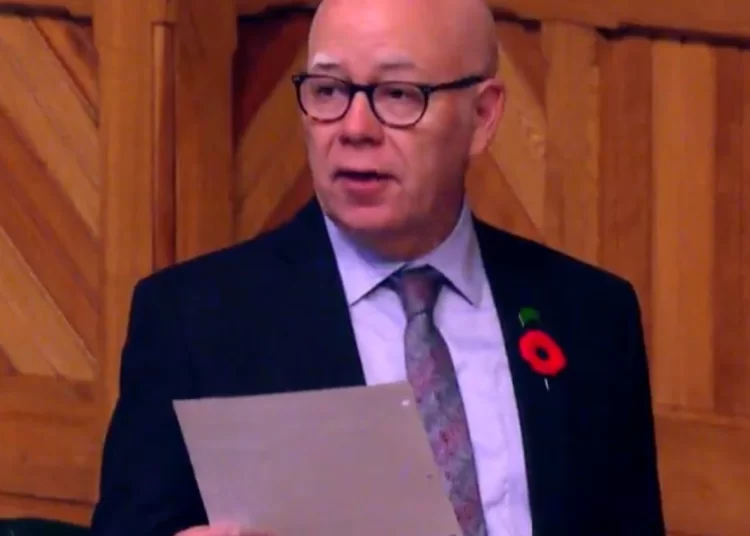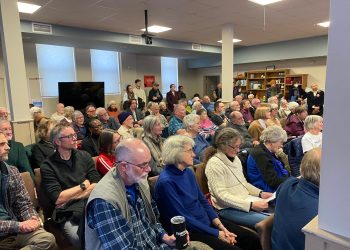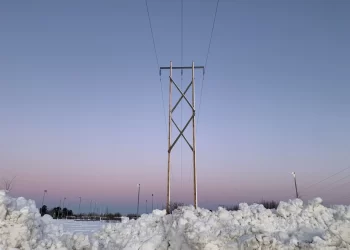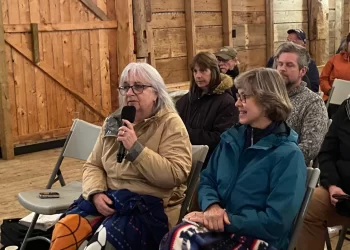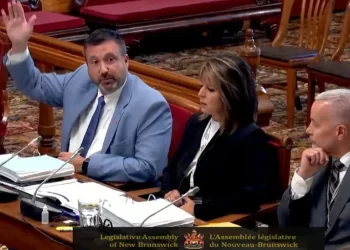New Brunswick’s Green Party leader says he’s convinced there’s a direct link between the proposed 500 MW gas/diesel plant near Centre Village and the Lorneville, artificial intelligence (AI) data centre that was announced less than two weeks ago.
“It’s very clear,” said David Coon who attended a public meeting several weeks ago in Lorneville that was hosted by the U.S. firm VoltaGrid and its partner Beacon AI Centers of Calgary, the two companies that are planning to build the AI data centre.
“The revelation that was made at the Lorneville meeting was that besides the 190 MW gas generating plant they’re going to build in Lorneville, they’re going to ask NB Power for another 190 MW because the AI brain they’re building there uses 380 MW of power,” Coon said today in a telephone interview with Warktimes.
“So, they need 190 MW from NB Power, which NB Power does not have to spare. Where are they going to get it?” the Green leader asked.
“They’re telling us they’re all worried about people using more electricity because of an increase in population and charging electric cars and all this. So, where are they going to get it? Well, the only place they could possibly get it is from the new gas plant in Tantramar.”
Coon also points out that NB Power seems desperate to bring the PROENERGY gas/diesel plant online in 2028, the same year that the proponents of the AI data centre are planning to get their project up and running.
Government and NB Power deny any connection
Both provincial Energy Minister René Legacy and NB Power told Brunswick News there is no connection between the two projects.
The newspapers quote Legacy as saying his understanding is that the Tantramar gas plant has been discussed since 2023 or earlier while the data centre is more recent.
For its part, NB Power is standing by statements it made last month when VP Brad Coady told the legislature’s public accounts committee that a surge in population growth in 2023 made him realize that the utility would run short of power by 2028.
Legacy also told Brunswick News that he won’t block NB Power from selling electricity to AI data centres even though they use huge amounts of power.
In 2023, the Higgs government passed a law banning NB Power from selling electricity to any more cryptocurrency data centres after two companies won approval for them in the Grand Falls area.
But according to Brunswick News, Legacy argues that data centres are needed in Canada to protect our sovereignty.
“Across the country, we are building capacity to make sure that we protect our data and it belongs to us and it’s on our territory,” the newspapers quote him as saying.
‘Ridiculous’
“That’s simply ridiculous,” Coon responds, adding that the CEO of the Texas-based VoltaGrid told the public meeting last week in Lorneville that his company wanted to build the AI data centre here because of its super-fast fibre optic system with a direct connection to New York City.
He also rejects the energy minister’s assertion that a data centre would promote economic development.
“Texas decided to go out and encourage these AI brains to be established in their state,” Coon says, “and now, as a result, municipal and state politicians are all raising the alarm about the impact on power rates and the lack of power supply and the fact that this is driving power rates up because they’re having to build new power sources for them,” he says.
“The big opportunities for economic development are involved in decarbonizing the economy in New Brunswick and the shift to smart grids, to renewables, to storage, to demand-side management, to wind and to solar,” he adds.
“These are the tremendous opportunities that exist here to transform our heating systems across the board to heat pumps and so on. So those are the kinds of economic development opportunities that should be seized,” Coon says.
“It’s just ironic that today Prime Minister Carney is in the province, he says, to speak about his buy-Canadian policy. And here we have NB Power lining up to buy power from an American energy company and sell power to an American AI company.”
To read an online CBC report on the Lorneville meeting, click here.

